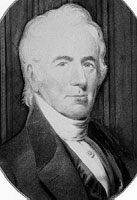Governor William King1 
b. 9 February 1768, d. 17 June 1852
Governor William King|b. 9 Feb 1768\nd. 17 Jun 1852|p7012.htm|Richard King|b. c 1718\nd. 27 Mar 1775|p6995.htm|Mary Black|b. 8 Oct 1736\nd. 25 May 1816|p6999.htm|John King||p7359.htm|Mary Stowell|b. s 1695\nd. 7 Mar 1770|p7284.htm|Samuel Black||||||
1st cousin 4 times removed of Ruth Minerva Fairfield.
1st cousin 6 times removed of Laura Jane Munson.
- Family Background:
- Fairfield and Allied Families

Governor William King
The following sketch of Governor King, published in "Willis' Law and Lawyers of Maine" A.D. 1863, was written by Mr. John H. Sheppard of Boston, Mass.
William King, the sultan of Bath, was a very remarkable man. He belonged to the first order of strong, energetic intellect. He was the seventh child of Richard King, of Scarborough, who had been a great exporter of lumber, and died wealthy. William was born in that place February 9th, 1768, and his early advantages were poor and limited. While his half brother, Rufus King, was laying the foundation of a great and splendid eminence in the academic groves of Cambridge, and his brother, Cyrus King, was preparing himself for distinction at the bar, William was tending a saw-mill in Saco, and there, perhaps, learnt the mystery of log-rolling, so essential to success in political life. The want of education was a misfortune and not a fault. He had studied the heart of mankind, and his knowledge of human nature seemed intuitive. His ambition was lofty, and his perseverance was untiring and inexhaustible. He felt that he must rely upon himself in making his way in the world, and he did. In business, as a merchant, he acquired a fortune, and built a spacious house near the water edge, where, as one of the greatest ship-owners in the United States, he could often hear the mariner's joyous song from his window, in the morning, or look at his vessels moored at the wharf. In politics, he was the head of the democracy in Maine; and although, touching the management of an electioneering campaign, there are many things to be considered, such as newspaper, club-room, caucus, town, county, or state convention, out-runners for candidates, and distributors of circulars and speeches, yet, there must be some master-spirit behind the curtain, like a fly-wheel to regulate all this machinery; and William King was pre-eminently the man for that. Had he only been blessed with a finished education, he would have been one of the first men in the United States; for he had the skill of Talleyrand, but much more virtue.
"His influence in bringing about the separation of Maine from Massachusetts was powerful; for he wielded the democracyof Maine, and managed the helm with great prudence. Such was his popularity, that, with an immense majority, he was elected the first governor; and, laying aside all party feelings, he administered that office with much ability, wisdom and fairness. His selections were excellent. Before the term was out, he resigned the chair of State, for an appointment at Washington, as commissioner under the Spanish treaty. He was afterwards collector of Bath, 1831-1834.
"In his person, he was tall and of a striking figure; and with a finely formed head, strongly marked features, high forehead, and black impending brows, he had a natural and majestic air of command, which impressed every beholder with respect; and more especially when the General was arrayed in his military cloak of blue and red. He had his faults; but he had warm friends and many admirers. He was unfortunate in his old age, not only in the loss of property and in domestic trials and afflictions, but in the decay of his own mind, once so active and vigorous. His sun went down in great darkness.
"I remember a long time ago, when stopping one night in Portland, at Paine's hotel, that, having been called up at four o'clock on a cold winter's morning, to take the stage to Boston, I heard a window open in the next room, and a loud voice hailing a passenger in the yeard who was in the eastern stage just arrived;--'Ah! Major Wood, is that you? what is the news from Boston? How go the votes?' It was Gen. King's voice. Such was this extraordinary man, an early riser, wide awake, and long before the dawn, watching the course of political events. In a brief sentence, his character may be summed up: if riding out on horseback for pleasure, he met a beggar asking alms, he would relieve him in a moment; but let him be in hot haste after some distant object, and the grand old General would ride over that very mendicant, nor cast a lingering look behind. He died June 17th, 1852, aged eighty-four."6
Children of Governor William King and Ann Nesbith Frasier
- Mary Elizabeth King1 b. 28 Sep 1817, d. 1847
- Cyrus William King+1 b. 25 Dec 1819
Citations
- [S707] John King of Boston MA, online http://members.tripod.com/~loupero/famous1.htm
- [S761] The New England Historical and Genealogical Register; (Online database: NewEnglandAncestors.org, New England Historic Genealogical Society, 2001), (Orig. Pub. New England Historic Genealogical Society, Boston, MA. The New England Historical and Genealogical Register, 148 vols., 1847-1994) 21:377.
- [S736] Wm. M. Sargent Esq., "Records of the First Congregational Church in Scarborough, Maine", Maine Historical and Genealogical Recorder 2:2 (1885): 83.
- [S708] Rossiter Johnson, editor, Twentieth Century Biographical Dictionary of Notable Americans (Boston, MA: The Biographical Society, 1904), 253.
- [S708] Rossiter Johnson, Bios of Notable Americans, 254.
- [S762] John H. Sheppard, "Governor William King", Maine Historical and Genealogical Recorder 1:3 (1884): 104-106.




